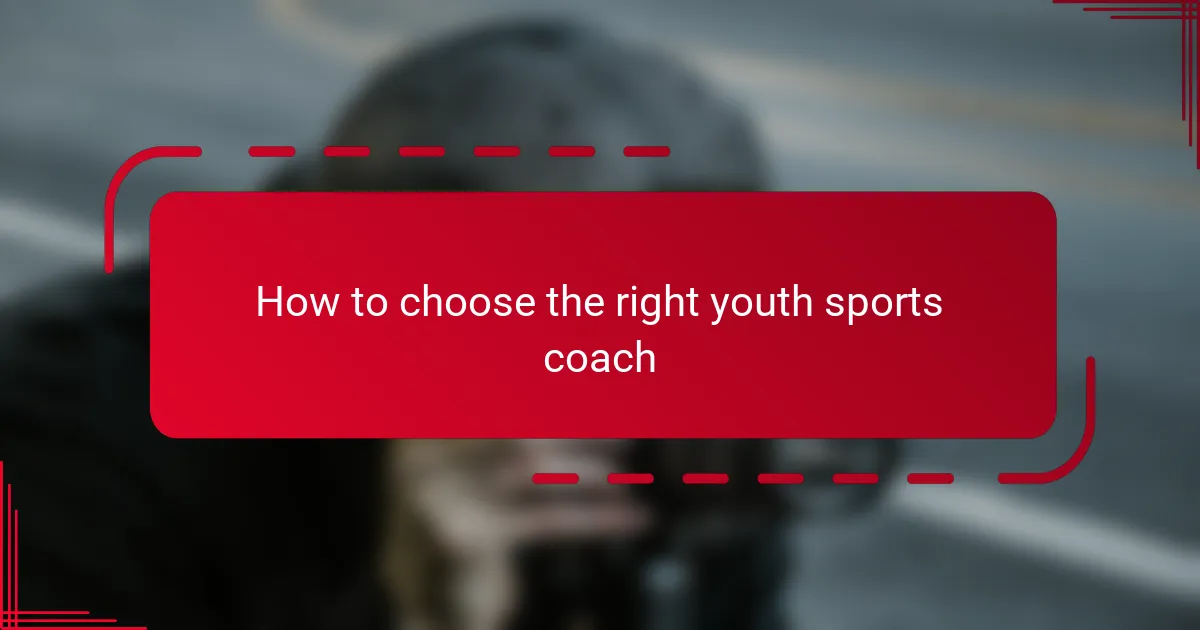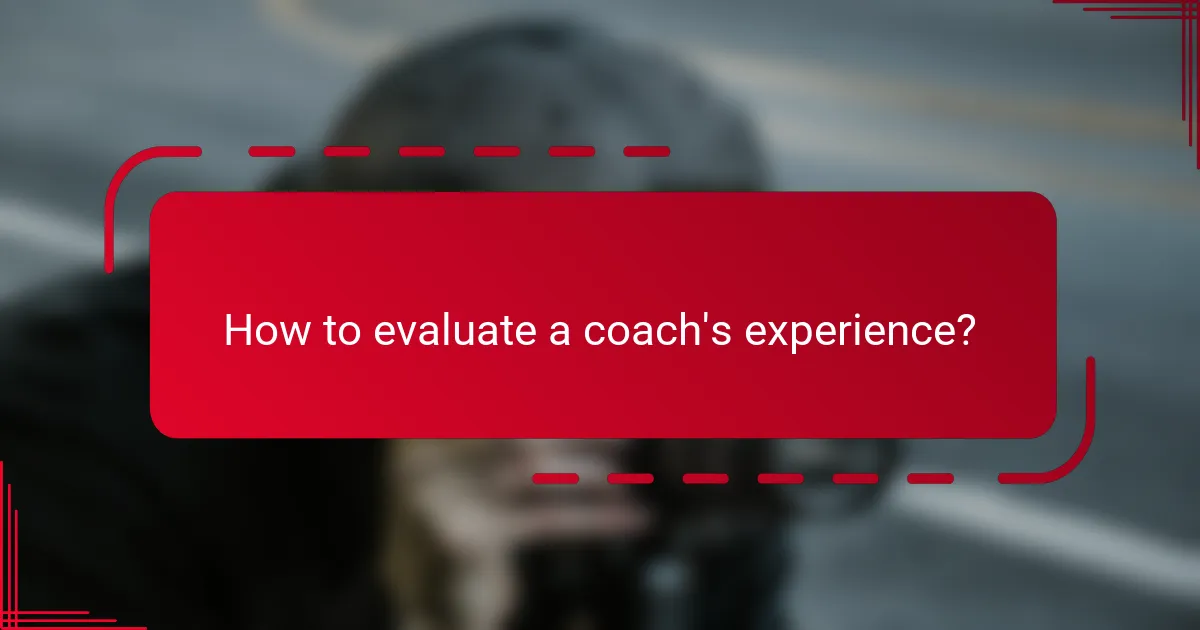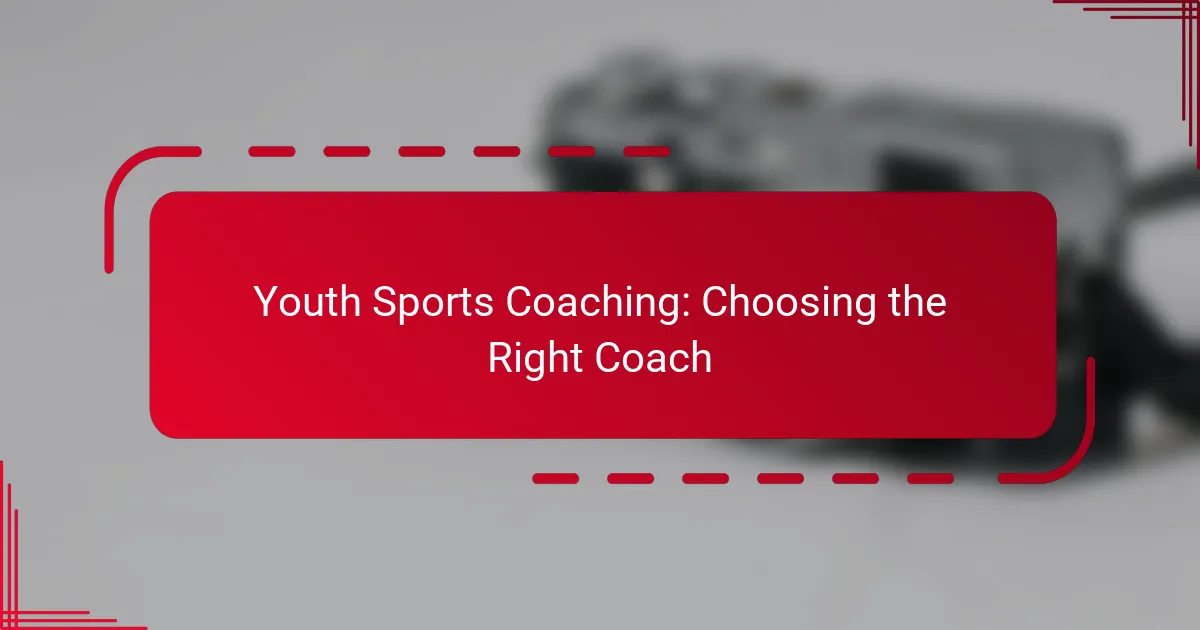Selecting the right youth sports coach is essential for creating a supportive and effective environment for young athletes. A qualified coach not only improves athletic skills but also instills values such as teamwork, discipline, and sportsmanship, ensuring a holistic development experience for each participant.

How to choose the right youth sports coach
Selecting the right youth sports coach is crucial for fostering a positive and productive environment for young athletes. A good coach not only enhances skills but also promotes teamwork, discipline, and sportsmanship.
Assess coaching qualifications
Start by reviewing the coach’s qualifications, including certifications and training specific to the sport. Look for credentials from recognized organizations, which often indicate a foundational understanding of coaching principles and safety protocols.
Additionally, consider any specialized training in youth development or sports psychology, as these can enhance a coach’s ability to connect with young athletes and address their unique needs.
Evaluate coaching experience
Experience is a key factor in effective coaching. Investigate how long the coach has been involved in youth sports and their history with different age groups. A coach with several years of experience is likely to have developed strategies for various situations and challenges.
It’s also beneficial to assess the coach’s experience in your specific sport, as familiarity with the game’s nuances can significantly impact the athletes’ development.
Consider coaching style
Coaching style can greatly influence a young athlete’s experience. Some coaches adopt a more authoritative approach, while others may focus on collaboration and encouragement. Determine which style aligns best with your child’s personality and learning preferences.
Observe practice sessions if possible, as this will provide insight into how the coach interacts with athletes and manages the team dynamic.
Check references and reviews
Gather feedback from other parents and athletes who have worked with the coach. Personal references can provide valuable insights into the coach’s effectiveness, reliability, and overall impact on the team.
Online reviews and testimonials can also be helpful. Look for consistent themes in the feedback, such as communication skills, motivational techniques, and the ability to foster a positive environment.
Understand communication skills
Effective communication is essential for a successful coaching relationship. A good coach should be able to convey instructions clearly and provide constructive feedback in a way that resonates with young athletes.
Assess how the coach engages with players during practices and games. A coach who listens actively and encourages open dialogue is likely to create a more supportive atmosphere for learning and growth.

What qualifications should a youth sports coach have?
A youth sports coach should possess a combination of relevant certifications, a solid background in sports education, and training in first aid and CPR. These qualifications ensure that the coach is equipped to teach effectively, promote safety, and foster a positive environment for young athletes.
Relevant certifications
Certifications play a crucial role in establishing a coach’s credibility and expertise. Many organizations offer coaching certifications specific to various sports, which often include training in coaching techniques, athlete development, and sports psychology. Coaches should seek certifications from recognized bodies, such as the National Federation of State High School Associations (NFHS) or the American Sport Education Program (ASEP).
Additionally, some leagues or associations may have specific certification requirements, so it’s essential to check local regulations. For instance, youth soccer leagues might require coaches to complete a specific coaching course before they can lead a team.
Background in sports education
A strong background in sports education is vital for a youth sports coach. This can include formal education in physical education, sports science, or kinesiology, which provides foundational knowledge about athletic development and coaching strategies. Coaches with this background are better equipped to understand the physical and psychological needs of young athletes.
Experience in playing or coaching the specific sport is also beneficial. Coaches who have participated at a competitive level often bring valuable insights and techniques that can enhance training sessions and game strategies.
First aid and CPR training
First aid and CPR training are essential qualifications for any youth sports coach. This training prepares coaches to respond effectively to emergencies, ensuring the safety of young athletes during practices and games. Many organizations recommend that coaches complete a certified first aid and CPR course, which often includes training on how to handle common sports injuries.
Additionally, keeping certifications up to date is crucial. Coaches should renew their first aid and CPR training every couple of years to stay informed about the latest procedures and guidelines. This not only enhances safety but also builds trust with parents and athletes alike.

What coaching styles are effective for youth sports?
Effective coaching styles for youth sports focus on fostering a positive environment, encouraging skill development, and promoting teamwork. Coaches should adapt their methods to the needs of young athletes, balancing authority with support to maximize engagement and performance.
Positive reinforcement approach
The positive reinforcement approach emphasizes rewarding desirable behaviors to encourage their repetition. This method can include verbal praise, small rewards, or recognition during practice and games. For instance, acknowledging a player’s effort or improvement can significantly boost their confidence and motivation.
Coaches should aim to provide feedback that is specific and constructive, helping young athletes understand what they did well and how they can continue to improve. This approach fosters a supportive atmosphere where players feel valued and motivated to participate actively.
Authoritative coaching style
The authoritative coaching style combines high expectations with emotional support, creating a structured yet nurturing environment. Coaches using this style set clear rules and goals while also being responsive to the individual needs of their athletes. This balance helps young players understand the importance of discipline while feeling secure and encouraged.
For example, an authoritative coach might establish practice schedules and performance targets but also take time to listen to players’ concerns and adapt training methods accordingly. This approach can lead to improved performance and stronger relationships between coaches and athletes.
Collaborative coaching methods
Collaborative coaching methods involve working closely with athletes to set goals and make decisions about training and gameplay. This style encourages players to take ownership of their development and fosters teamwork. Coaches can facilitate discussions where players contribute ideas and strategies, promoting a sense of community within the team.
Implementing collaborative methods can be as simple as involving players in practice planning or allowing them to suggest drills. This approach not only enhances engagement but also helps develop critical thinking and leadership skills among young athletes.

How to evaluate a coach’s experience?
Evaluating a coach’s experience involves examining their background in youth sports, including their coaching years, track record of success, and engagement with local sports initiatives. This assessment helps ensure that the coach is equipped to foster a positive and effective learning environment for young athletes.
Years of coaching youth sports
Consider the number of years a coach has spent working with youth sports teams. A coach with several years of experience is likely to have developed effective teaching methods and a deep understanding of youth development. Look for coaches with at least three to five years in youth coaching roles, as this often indicates a solid foundation in the sport.
Additionally, assess whether their experience includes coaching different age groups or skill levels. A versatile coach who has worked with various teams can adapt their approach to meet the unique needs of each athlete.
Success with previous teams
Reviewing a coach’s success with previous teams can provide insight into their effectiveness. Success can be measured through win-loss records, tournament placements, or player development. A coach who consistently leads teams to competitive success demonstrates the ability to motivate and enhance athletes’ skills.
Ask for references or testimonials from former players or parents to gain a clearer picture of the coach’s impact. Positive feedback regarding player growth and team dynamics can indicate a coach’s ability to create a supportive and successful environment.
Involvement in local sports programs
A coach’s involvement in local sports programs can reflect their commitment to the community and youth development. Coaches who participate in clinics, workshops, or community events often stay updated on best practices and new coaching techniques. This engagement can enhance their coaching effectiveness and provide networking opportunities.
Look for coaches who are active in local leagues or associations, as this involvement can indicate a dedication to fostering youth sports. Their connections within the community can also lead to valuable resources for players and teams.

What are the costs associated with hiring a youth sports coach?
The costs of hiring a youth sports coach can vary significantly based on factors such as location, the coach’s experience, and the type of training provided. Understanding these costs helps parents make informed decisions when selecting a coach for their child.
Hourly rates for private coaching
Hourly rates for private coaching typically range from around $30 to $100 per hour, depending on the coach’s qualifications and the sport involved. Coaches with specialized training or extensive experience may charge higher rates, while newer coaches might offer more affordable options.
When considering private coaching, it’s essential to evaluate the coach’s background and the specific needs of your child. Some coaches may offer package deals that reduce the hourly rate if multiple sessions are booked in advance.
Team coaching fees
Team coaching fees can vary widely, often ranging from a few hundred to several thousand dollars per season. These fees usually cover the entire season, including practices, games, and sometimes tournaments. Factors influencing team fees include the level of competition and the resources provided by the organization.
Parents should inquire about what is included in the team fees, such as uniforms, travel expenses, and additional training sessions. Understanding these elements can help avoid unexpected costs throughout the season.
Additional costs for training materials
In addition to coaching fees, parents should budget for training materials, which may include equipment, uniforms, and instructional resources. These costs can range from $50 to several hundred dollars, depending on the sport and level of play.
It’s advisable to discuss with the coach or organization about necessary materials and any potential discounts for bulk purchases. Additionally, consider second-hand options for equipment to help manage expenses effectively.
